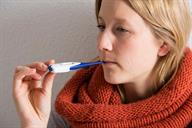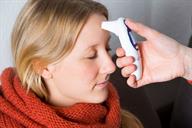ThisisPatientEngagementcontent
Fever (Adult)
Learn more about our Patient Engagement products now! Turn your patients into active participants in their healthcare by giving them easy access to the same evidence-based information you trust – but delivered in an easy-to-understand format.


A fever is a high body temperature that is 100.4°F (38°C) or higher. Brief mild or moderate fevers generally have no lasting effects, and they often do not need treatment. Moderate or high fevers can feel uncomfortable and can sometimes be a sign of a serious problem. Fevers can also cause dehydration because the body may sweat, especially if the fever keeps coming back or lasts a long time.
You can use a thermometer to check for a fever. Body temperature can change with:Medicines
General instructions
This information is not intended to replace advice given to you by your health care provider. Make sure you discuss any questions you have with your health care provider.
Cookies are used by this site. To decline or learn more, visit our cookie notice.
Copyright © 2025 Elsevier, its licensors, and contributors. All rights are reserved, including those for text and data mining, AI training, and similar technologies.